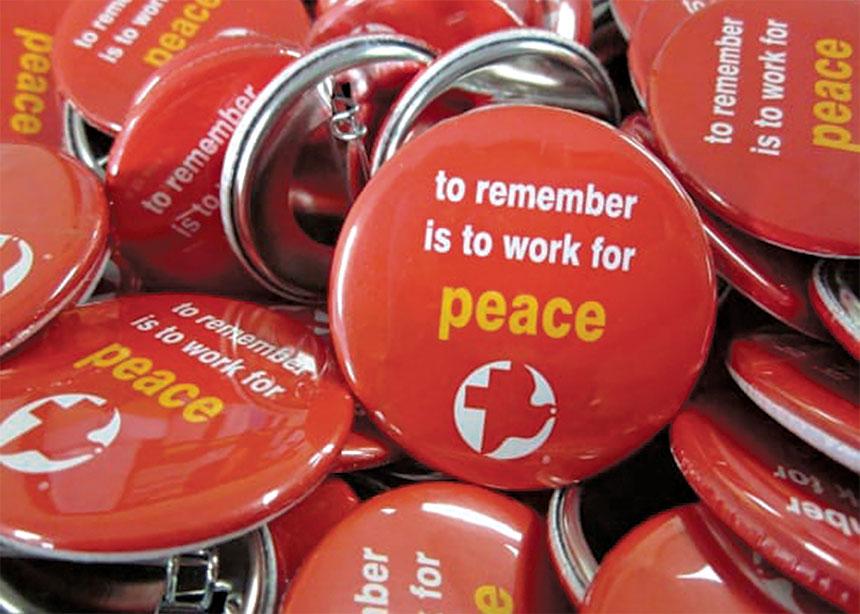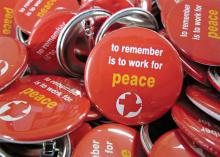At this time of year, I begin to rummage through the various drawers of miscellany in search of those red Mennonite Central Committee buttons that say, “To remember is to work for peace.” Maybe you wear such a button too in the run-up to Remembrance Day.
One year I offered an extra button to a friend who I knew had the same values around peacemaking. After one day, the friend returned it to me. With the button on their lapel, an aggressive confrontation had occurred on the subway. This told them the red button was too much of a risk to wear as a racialized person.
That incident shows we are all socially situated. From our different positions, we all need to humbly but actively figure out how to work for the full and whole inclusion and well-being of all peoples. That means addressing any and everything that operates against what we call shalom, that is, the peaceful kingdom of God.
Peacemaking is inherently contentious. The Royal Canadian Legion was given trademark for poppies of any colour by an Act of Parliament in 1948. A storekeeper who used to distribute white poppies told me he was hit by a cease-and-desist order.
In fact, the Legion website claims “the Legion’s lapel Poppy is a sacred symbol of Remembrance” (capitalization included). I hope wearing this button is not all you do for peace. But even if it is, you are contributing to a counter-narrative about the meaning of the day, and a different sort of sacredness.
This became clear in my early experience after 9/11. The profusion of comments on a professional listserv led me to try to say something that I thought was carefully worded. I said we should be careful to consider all the dimensions of the issue and what the grievances may be, and not just focus on the shocking incidents of violence. I was resoundingly rebuked, and temporarily ejected from professional company.
Then, guessing at the direction the pastor of the church I attended at the time would probably go with in his Sunday sermon, I went to talk with him about my pacifist convictions. “I have already decided to preach holy war,” he told me.
We must promote a different worldview.
So too with the recent eruption of violence involving Israel and Hamas. Right as I sat down to write, all hell exploded in Israel and Gaza. International law has been broken by both sides.
I will never support Hamas’ horrific actions. Nor will I align with the Israeli prime minister’s vow for retaliation that will “reverberate for generations.” The United States announced it will send military supplies, so Israel does not run out of “critical assets” to “defend” its people. Asymmetrically, the people of Gaza may run out of critical items like food, water, medical supplies, or even electricity because of the total siege (at the time of writing), on top of the 16-year Israeli blockade of Gaza.
I encourage you to read the statement and prayer requests from Jack Sara, president of Bethlehem Bible College and partner of Mennonite Church Canada.
War is too brutal a tool to bring “peace.” Whatever your thoughts about the altercations in Israel-Palestine, situations of violence and response should never be the vehicle for the reduction of human rights, abuse of authority, or demonizing of the antagonists.
It should be a time to promote our highest gospel values, in which following God is linked with specific efforts at creating peace, security, justice and well-being for everyone, regardless of whether they are neighbour or enemy. After all, Jesus calls us to love both.
Randy Haluza-DeLay lives in Toronto and can be reached at haluzadelay@gmail.com.




Comments
Good article. Lasting peace is only through Jesus Christ.
Good article, Randy. Everywhere I turn people are being manipulated and encouraged to side with one evil against another. It takes a lot of courage to join neither.
Thank you Randy for putting words together in a careful and beautiful way. You express my heart and sentiments very well. The bombing of an ancient Church in Gaza sheltering innocent people ought to be enough to convince everyone that holy war is always wrong. Yes, let's speak and act following the way of Jesus, prince of peace.
Thanks for insightful explanation of peace-making on Israel and Palestinian conflict. It's tough to negotiate the complexity, with such biased reporting.
A friend lent me the October issue of Canadian Mennonite. Thank you for this article.
I'm not a Mennonite, but I wear my peace button every November 11th, alongside a poppy.
Many years ago I happened to meet a Mennonite couple who were wearing the buttons, and I immediately wanted one for myself. They gave me one of theirs.
Since then I've twice brought some to my Quaker meeting, where they are much appreciated.
My parents, members of CND in England, used to wear white poppies, but I wouldn't feel good about that. I think that wearing the peace button alongside a poppy recognizes the heroism and sacrifice of those who have fought in wars, while also recognizing that war is never the answer, and that work for peaceful solutions needs to go on all the time.
Thank you.
Christine Tansley.
Add new comment
Canadian Mennonite invites comments and encourages constructive discussion about our content. Actual full names (first and last) are required. Comments are moderated and may be edited. They will not appear online until approved and will be posted during business hours. Some comments may be reproduced in print.